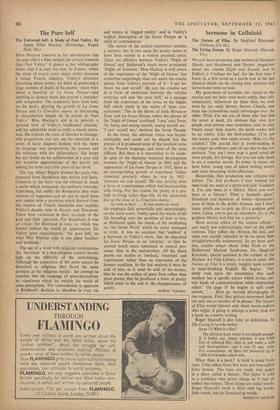The Pure Self
MISS MACKAY observes in her introduction that 'no poet offers a finer subject for critical research than Paul Valdry.' A glance at her bibliography shows that it is only too true. In France, where the study of nearly every major writer becomes a minor French industry, Valery's extensive theorising about poetry, his habit of producing a large number of drafts of his poems—there were about a hundred of La feline Parque—and omitting to destroy them, has proved a consider- able temptation. The academics have been busy on the drafts, plotting the growth of La Jenne Parque and Le Cimetiere marin, or discoursing at characteristic length on 'la pen.see de Paul Valdry.' Miss Mackay's aim is to provide a 'general view of Valery's intellectual attitude,' and her admirable study is really a rescue opera- tion. She reduces the mass of theories to manage- able proportions and sets out the essentials in a series of lucid chapters dealing with his views on language and composition, his poetics and his relations with the philosophers. She keeps her eye firmly on his achievement as a poet and her sensitive appreciations of the poetry are among the most enjoyable parts of her book.
The late Albert Beguin divided the poets who stemmed from Baudelaire into Artists and Seers. Common to the Seers was the attempt to reach a realm which transcends our ordinary everyday experience, but unlike the Romantics they were enemies of vagueness and set out to chart these new realms with a precision which derived from the masters of French classicism and explains Valery's double debt to Racine and Descartes. There were variations in their accounts of the goal and their approach. For Baudelaire it was an extase; for Rimbaud la vraie vie which was hidden behind the world of appearances; for Valery 'pure consciousness,' the pure Self,' or what Miss Mackay calls in one place 'intellec- tual beatitude.'
The use of a word with religious connotations like 'beatitude' in a non-religious context throws light on the difficulty of the undertaking. Although the experience of the poets cannot be described as religious, they faced the same problem as the religious mystic: the attempt to translate into the language of sense-perceptions an experience which lay outside the world of sense-perceptions. The contradiction is apparent in Rimbaud's decision to abandon la vraie vie
and return to 'rugged reality,' and in Valdry's explicit description of the Jeune Parque as 'a child of contradiction.'
The nature of the central experience remains a mystery, but in two cases the poetry seems to have been rooted in a violent personal crisis. 'There are affinities between Valdry's 'Night of Genoa' and Mallarme's much more protracted 'Night of Tournon.' Miss Mackay is well aware of the importance of the 'Night of Genoa,' but somewhat surprisingly does not quote the crucial phrase from Valery's account of it: 'I am be- tween me and myself.' He saw the creative act as a form of mediation between the relative everyday self and 'the pure Self,' as a passage from the experience of the lower to the higher Self which dwelt in the realm of 'pure con- sciousness.' This is the theme of both Monsieur resit, and La Jeune Parque where the phrase of the 'Night of Genoa' is echoed. 'I am,' says Teste, `by being and seeing myself; seeing myself see.' 'I saw myself see,' declares the Jeune Parque.
In the event, the ultimate vision was incom- municable and could not be shared, but the pursuit of it produced some of the loveliest verse in the French language, and some of the most difficult. But there is a reservation to be made. In spite of the immense technical development between the 'Night of Genoa' in 1892 and the appearance of La Jeune Parque in 1917, there is no corresponding growth of experience. Valery remained precisely where he was in 1892: 'between me and myself.' He was striving after a form of consciousness which was incompatible with living. For this reason the poetry is a pre- lude to living rather than life. In the celebrated line at the close of Le Cimetiere mirth:
Le vent se level . . . 11 faut tenter de vivre!
the emphasis falls powerfully and unmistakably on the word tenler. Valery spent the whole of his life brooding over the problem of how to live, as Mallarind spent the whole of his meditating on 'the Great Work' which he never managed to write. It was no accident that 'method' is a keyword in Valery's work, that he described La Jettne Parque as an 'exercise,' or that he seemed much more interested in mental pro- cesses than in the end-product. All his finest poems are studies in 'method,' exercises' and experiments rather than an expression of the human condition. In the last analysis it must be said of him, as it must be said of his master, that he was the author of great lines rather than great poems, that he produced a form of poetry which leads in the end to the disappearance of


































 Previous page
Previous page